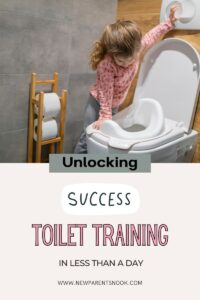Some links on our blog are affiliate links, meaning at no extra cost to you, we may earn a commission if you purchase through them. We participate in the Amazon Affiliate Program, and we recommend products we believe in. Your support helps us keep providing valuable content. Thank you!
The Montessori Method for potty training takes a unique approach that aligns with the broader Montessori principles of independence, respect for the child’s natural development, and the importance of a prepared environment.
Developed by Dr. Maria Montessori, this educational philosophy extends into various aspects of a child’s life, including the significant milestone of toilet training.
Here’s how the Montessori Method applies to potty training:
Key Principles:
Child-Led Process: Following the Montessori philosophy, potty training begins when the child shows interest and readiness.
Parents and caregivers are observers, looking for signs that the child is ready to start this new challenge.
Prepared Environment: The environment is set up to enable success.
This includes having a small potty available, as well as clothes that are easy for the child to remove independently.
The goal is to empower the child to take charge of their own body and needs.
Focus on Independence: The emphasis is on teaching the child to be aware of their body’s signals and to act upon them independently.
Children are encouraged to sit on the potty without being asked, to pull down their own pants, and to participate in the clean-up process.
Respectful Communication: Communication is key in the Montessori approach.
Parents talk to the child about using the toilet in a respectful and straightforward manner, avoiding baby talk and making the child feel valued and understood.
Learning Through Natural Consequences: The Montessori Method often uses natural consequences as learning opportunities.
For example, if a child experiences an accident, they are involved in the clean-up process, helping them understand the importance of using the potty.
Advantages:
Promotes Self-Esteem and Autonomy: By fostering independence and respecting the child’s ability to learn, this method can boost self-esteem and a sense of autonomy.
Seamless Learning Experience: Integrating potty training with the Montessori approach to learning makes the process more natural and less stressful for both children and parents.
Develops Life Skills: Beyond just potty training, children develop other important life skills, such as dressing themselves and taking responsibility for their personal hygiene.
Considerations:
Requires Patience: This method may take longer than more direct, parent-led approaches, as it relies on the child’s readiness and pace.
Preparation of the Environment: Parents need to invest time in preparing the environment and choosing clothing and potty chairs that enable independence.
Consistency Across Caregivers: For success, all caregivers should be familiar with the Montessori principles and apply them consistently.
In Summary
The Montessori Method for potty training is ideal for parents who wish to nurture their child’s independence and are willing to wait for their child to show signs of readiness.
It’s a respectful, empowering approach that aligns with the broader goals of Montessori education, fostering a child’s growth and self-reliance in all areas of life.
Here’s a link to a more in depth guide to approach this Method.







